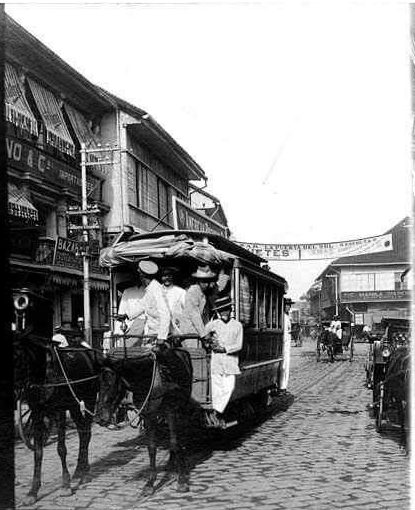We had a hard time getting to Manila. Twice the ships we had engaged passage on were taken out of the service, but finally we got off on a *’ toothpick,” as my wife called it, the steamship Kueichow, a little craft of 2000 tons, and with only four cabins for first-class passengers, a tiny dining saloon, etc., all heaped together, and quite without, to us, at least, ventilating facilities for disagreeable weather. My wife was the only woman on board. I had been ill, the humidity distressing, and altogether our little voyage from Hongkong commenced under depressing conditions. Nobody had given the China Sea a good name. Happily after the first twenty-four hours we had a smooth sea, and were hourly thankful for it. Our engine pushed us along at only eight knots an hour; so the trip which usually consumes forty-eight hours took almost 4 days for us. I could eat but little of the fare provided, and glad we were to land yesterday meaning and to receive a warm greeting from our friend.
Prof. Alvin J. Cox, who speedily took us in his motor-car to a pleasant boarding-house which he had selected for us. In the drier air of Manila, and with things I can eat, I am improving and hope to soon be ready for work.
Nothing interesting occurred on the ship unless it was the discussions participated in by all hands on things relating to this world and the next. One young man at tiffin one day briskly challenged my use of the word “providence”. I made no reply until another said, “You do not seem very willing to dispute what he says.” I replied, “I have learned that there is not much use in arguing with any man who flys in the face of the simplest facts in the creation, and is so foolish as to claim that he does not believe in a God.”
Then I took my turn detailing the miracles of prophecy, and putting question after question to the would-be non-believer, following it by telling those present of statements made by Sir Oliver Lodge, and others, acknowledging their inability to base spiritual truths on recently questioned scientific so-called facts, and Sir Oliver’s admission, over one year ago, that many scientific beliefs that have been in vogue for a good many decades must be recast. My young opponent reminded me, and I told him courteously thereof, of the old Quaker who met a doubting youth who declared that he would not believe in anything that did not appeal to his senses. The old Friend asked, “Hast thou ever seen thy brains?” “No,” was the reply. “Hast thou ever smelled thy brains?” ‘*No.” “Hast thou ever tasted thy brains?” Reluctantly again came the answer, “No.” Then followed the inquiry, “Art thou sure that thou hast any brains?”
Our conversation concluded by my speaking of the fact that many do not want to believe in a God because they dare not bring their lives in conformity to His laws or go through the processes of repentance and a changed life. Above all, they are so very foolish as to bar themselves out of the joy and peace in believing which upholds them in this life and qualifies them for that which is to come. Possibly I was on that trying little voyage for the purpose of giving a few young men something to think about before they entered into the temptations of their colonial career. They were nice young fellows.
One small table in the little dining-saloon was filled with Americans, and the other one with Chinamen. The latter were educated gentlemen, and most agreeable to meet with. The Americans were mostly assertive, talked loudly, some used indifferent grammar and could eat a course dinner in about twenty minutes. The Chinese were almost exactly the reverse as to table manners. Yet most of the Americans eyed the Orientals suspiciously or refused to talk directly to them when they met on our meager deck space. I was a “go-between.” If our country is to get its share of commerce in the Far East, and wield the influence there that we ought to in many respects, our people must be taught to assume a different attitude from what many of them do toward other races. A broad Christian spirit is our only hope.
